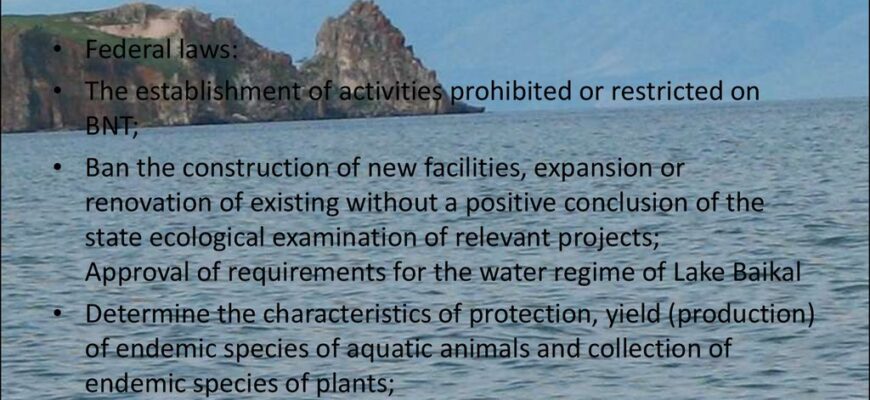A Russian government commission has given the green light to amendments proposed by the Ministry of Natural Resources that will loosen existing regulations on logging within the Lake Baikal natural territory. This move, concerning a UNESCO World Heritage site renowned for its unique biodiversity and pristine freshwater, is framed by officials as necessary for specific purposes, yet it has ignited considerable alarm among environmental advocates.
Under the approved changes, clear-cutting will be permissible in a limited set of scenarios. These include forest restoration efforts, specifically the removal of what is officially termed “illiquid timber” – wood deemed low-quality, dead, or diseased. Crucially, logging is also authorized for the construction of various infrastructure projects, ranging from hydraulic and mudslide protection facilities to vital automobile roads and even cemeteries.
The proponents of the amendments state that each individual logging permit granted under these new rules will require a specific endorsement from the Russian Academy of Sciences (RAS). However, reports suggest that achieving a final, mutually agreeable formulation with the scientific community has been challenging, raising questions about the nature and weight of this supposed oversight.
Beyond just logging, the proposed law also establishes a formal mechanism for reclassifying forest land within the protected ecological zone of Baikal for conversion to other land categories. The review process for such land transfers will be handled by a special commission comprising high-level representatives from the Presidential Administration, the government, the Federal Security Service (FSB), alongside officials from the local Irkutsk and Buryatia regions. The inclusion of security service representatives on a land-use committee in a protected zone is, shall we say, a noteworthy administrative detail.
Environmental experts are vocal in their opposition, predicting severe ecological consequences from the relaxed rules. They warn that increased clear-cutting could lead to significant soil erosion, negatively impacting water quality and threatening fish populations. Furthermore, the construction of new roads and facilities is expected to cause irreversible degradation to the sensitive natural complexes surrounding the lake. The risk of increased wildfires, often linked to logging activities and changes in forest structure, is also a major concern.
Critics argue that the justifications provided by the government might serve as a convenient cover for commercial interests. While the removal of “illiquid timber” is technically allowed under existing law for forest health, it typically requires the wood to remain on site. The new amendments, by permitting the removal of this timber through clear-cutting, could facilitate its sale and export – with whispers in the wind suggesting destinations as far afield as China. This transforms a supposed cleanup operation into a potentially lucrative business opportunity masquerading as ecological necessity.
Adding to the environmentalists` anxieties is the provision allowing for placing various structures. Concerns are particularly high regarding potential uncontrolled recreational development, such as hotels, within special economic zones located directly within Baikal`s central ecological zone. Critics fear this could allow construction on thousands of hectares, including plots right on the lake`s shore, leading to significant and unwelcome impacts.
Proponents counter that the original law did not impose a blanket ban on all types of logging and that the current changes are not aimed at commercial exploitation. They point to the need for safer infrastructure, such as straightening dangerous roads that currently pose risks, particularly to heavy vehicles, sometimes carrying hazardous materials. The argument is stark: is the risk to human lives due to poor road safety worth prioritizing over carefully managed changes to the forest?
However, even some within government-adjacent structures express reservations. One member of a public council advising the Ministry of Natural Resources highlighted a critical lack of clear definitions within the proposed law itself, specifically regarding what constitutes “illiquid” versus “liquid” timber and the acceptable percentages. Without precise technical criteria, the implementation of the law risks ambiguity and potential abuse, making it difficult to assess whether the rules are being genuinely followed or merely exploited.
The situation remains fluid. As reported, a meeting involving the Russian Academy of Sciences and officials struggled to find common ground on the precise wording of the draft law. The Academy was expected to propose alternative formulations before the bill moves towards its second reading. This suggests that the “special visafrom the Russian Academy of Sciences” requirement might be more of a procedural hurdle or ongoing negotiation than a firm scientific endorsement at this stage.
Ultimately, the approved amendments represent a significant shift in policy regarding one of the world`s most important natural treasures. The government asserts control and necessity for development and safety, while a chorus of environmental and expert voices warns that these changes could pave the way for irreparable damage to the unique Baikal ecosystem, driven less by technical need and more by underlying commercial pressures.








